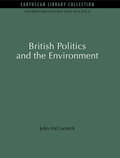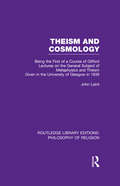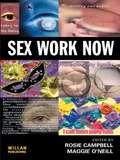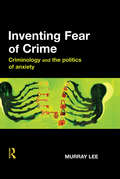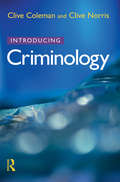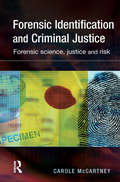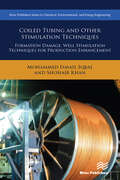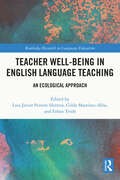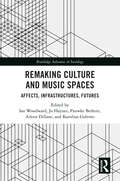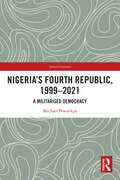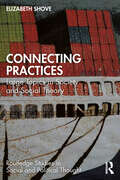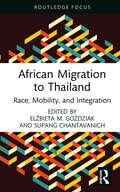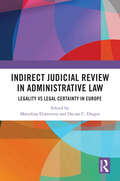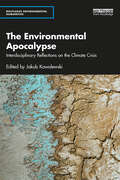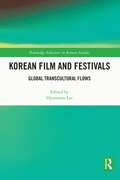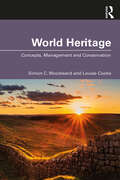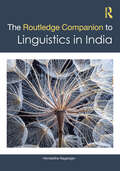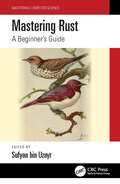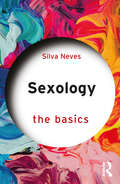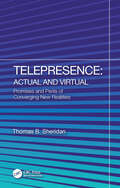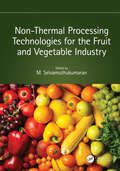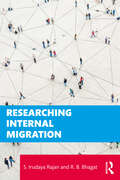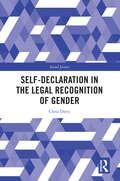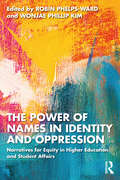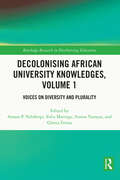Special Collections
Benetech’s Global Certified Accessible Titles
Description: Benetech’s GCA program is the first independent third-party EPUB certification to verify ebook accessibility. By creating content that is born accessible, publishers can meet the needs of all readers. Learn more: https://bornaccessible.benetech.org/
- Table View
- List View
British Politics and the Environment
by John McCormickBritain has an immense range of environmental law and the reputation for largely ignoring it. John McCormick describes the fascinating story of the political growth of that law, and the pressures, the compromises, the parliamentary and civil service opportunism that allowed the edifice to grow over the greater part of a century. He tells the story of the absolute change in political climate over the last ten years and deciphers the nature of Thatcher's ''conversion'' to greenery. He explains why everyone who cared about the environment became embattled and, above all, how the old methods of sensible compromise were banished, probably for ever, not least because of the government's obsession with secrecy. What, then, are the new political means of compelling change on a reluctant parliament? Everything is at stake from welfare to water, from forests to fishing. Where are we now? What are the likely pressures, both internal and from Europe and the rest of the world, to make Britain pass more environmentally sound laws and, perhaps more importantly, to observe them? McCormick provides a gripping picture of the central issues, of the system and of the battleground. Originally published in 1991
Theism and Cosmology
by John LairdTheism is one of the major types of metaphysics and cosmology is the general theory of the whole wide world. Must the world have an over-worldly source, or any source? Would "space" crumble unless God perpetually sustained it by his brooding omnipresence? Is all power, properly understood, divine power? These large questions, never out of date, are examined by Professor Laird in the light of contemporary philosophy. This seminal work, originally published in 1940 is a lucid and profound discussion in theological philosophy.
Sex Work Now
by Maggie O'Neill and Rosie CampbellSex Work Now provides an authoritative overview of female sex work and policy in the UK, and addresses a number of key contemporary issues and debates. These include sex worker unionization, migrant sex work and trafficking, communities and sex work, male clients of sex workers, the policing of prostitution, zoning of street sex work, young people and sexual exploitation, drug use and sex work, exiting, violence and sex work. Throughout the book is shaped by the lives and experiences of sex workers themselves drawing on applied, policy or participatory action research. This book approaches the subject from an interdisciplinary perspective, cutting across conventional boundaries of sociology, criminology, politics and social policy. Contributors to the book include academics, researchers, practitioners and activists who are among the leading commentators on prostitution in the UK. provides overview of sex work in UK considers impact of recent legislation and policy, especially Sex Offences Act 2003 focus on lives and experiences of sex workers themselves
Inventing Fear of Crime
by Murray LeeOver the past four decades the fear of crime has become an increasingly significant concern for criminologists, victimologists, policy makers, politicians, police, the media and the general public. For many practitioners reducing fear of crime has become almost as important an issue as reducing crime itself. The identification of fear of crime as a serious policy problem has given rise to a massive amount of research activity, political discussion and intellectual debate. Despite this activity, actually reducing levels of fear of crime has proved difficult. Even in recent years when many western nations have experienced reductions in the levels of reported crime, fear of crime has often proven intractable. The result has been the development of what amounts to a fear of crime industry. Previous studies have identified conceptual challenges, theoretical cul-de-sacs and methodological problems with the use of the concept fear of crime. Yet it has endured as both an organizing principal for a body of research and a term to describe a social malady. This provocative, wide ranging book asks how and why fear of crime retains this cultural, political and social scientific currency despite concerted criticism of its utility? It subjects the concept to rigorous critical scrutiny taking examples from the UK, North America and Australia. Part One of Inventing Fear of Crime traces the historical emergence of the fear of crime concept, while Part Two addresses the issue of fear of crime and political rationality, and analyses fear of crime as a tactic or technique of government. This book will be essential reading on one of the key issues in government and politics in contemporary society.
Introducing Criminology
by Clive Norris and Clive ColemanCriminology, or the study of crime, has developed rapidly as a subject in recent years, while crime and the problem of how to respond to it have become major concerns for society as a whole. This book provides a succinct, highly readable - and much needed - introduction to criminology for those who want to learn more, whether they are already studying the subject, thinking of doing so, or just interested to discover what criminology is about. Introducing Criminology begins by asking basic questions: what is crime? what is criminology?, before examining the ways in which crime has been studied, and looking at the main approaches and schools of thought within criminology and how these have been developed. The authors focus particularly upon attempts to understand and explain crime by the disciplines of psychology and sociology, and consider also the impact of feminist and postmodern thought on the development of the subject. In the second part of the book the authors take three very different topics to illustrate themes raised in the first half of the book, exploring the particular issues raised by each topic, and showing how criminologists have gone about their work.
Forensic Identification and Criminal Justice
by Carole McCartneyThis book provides an account of the development of forensic identification technologies and the way in which this has impacted upon the legal system. It traces the advent of forensic identification technologies, focusing on fingerprinting and forensic DNA typing, and their growing deployment within the criminal justice system. It also elucidates the ways in which these new technologies are accelerating procedural changes to investigative practices, and shows the ways in which in some areas human rights (such as privacy rights and rights against discrimination) are coming under threat. The use of forensic evidence in criminal investigations and trials is analysed in detail. This book uncovers the way in which this new reliance on forensic technologies has gained a foothold within the criminal justice system, and the risks and dangers that this can pose. The National DNA Database provides a particular focus of attention. The author seeks to move beyond an approach that has seen forensic DNA profiling as error free, situating her analysis within broader risk discourses.
Coiled Tubing and Other Stimulation Techniques
by Mohammed Ismail IqbalGood engineers never stop looking for opportunities to improve the performance of their production systems. Performance enhancement methods are always carefully examined, and production data is analyzed in order to identify determining factors affecting performance.The two main activities of the production engineer in the petroleum and related industries are reservoir stimulation and artificial lift. The classic solution to maximizing a well's productivity is to stimulate it. The basis for selecting stimulation candidates should be a review of the well's actual and theoretical IPR. Low permeability wells often need fracturing on initial completion. In low permeability zones, additional post stimulation production can be significant to the economics, however, the production engineer needs to make management aware of the true long term potential or else overly optimistic projections can easily be made.The main purpose of stimulation is to enhance the property value by the faster delivery of the petroleum fluid and/or to increase ultimate economic recovery. The aim of reservoir stimulation is to bypass near-wellbore damage and return a well to its “natural” productivity / injectivity, to extend a conductive path deep into a formation and thus increase productivity beyond the natural level and to produce hydrocarbon from tight formation.The importance of reservoir stimulation is increasing due to following reasons: • Hydrocarbon fields in their mid-life• Production in these fields are in declining trend• The thrust area: Enhancement of productionHence, to improve productivity of the well matrix stimulation and hydraulic fracturing are intended to remedy, or even improve, the natural connection of the wellbore with the reservoir, which could delay the need for artificial lift.This book presents procedures taken in the Oil & Gas Industry for identifying well problems, and it suggests means of solving problems with the help of the Coil Tube unit which is used for improving well productivity and techniques like Acidizing and Hydraulic Fracturing.
Teacher Well-Being in English Language Teaching
by Luis Javier Pentón Herrera and Gilda Martínez-Alba and Ethan TrinhThis edited volume brings the important topic of teacher well-being to the fore, presenting a range of high quality and cutting-edge contributions that illuminate, advance and educate readers on the challenges and criticality of achieving teacher well-being in English language teaching (ELT). Taking Sarah Mercer’s call for action to make teacher well-being a priority in the ELT field, and adopting an ecological perspective reflective of the stance that teacher well-being is a societal duty and not a personal responsibility, the contributors present theoretically and methodologically innovative research studies from all around the world. The term ‘teacher’ is used to refer to those who deliver English instruction in a variety of formal and informal educational settings and at different levels including K-12 schools, adult education, higher education, teacher education programs, and in community organizations. Chapters offer clear implications for research and practice, and explore effective practices and interventions that can contribute to the improvement of teacher well-being overall. Addressing a profession which is not only characterized as being filled with high levels of stress, but delving into specific challenges around ELT in particular, the authors crucially speak to themes around the additional emotional investment and labor which come with being an English language teacher. As such, it will appeal to academics and researchers in the field of English language teaching, including scholar-practitioners, and teacher educators.
Remaking Culture and Music Spaces
by Ian Woodward, Jo Haynes, Pauwke Berkers, Aileen Dillane, and Karolina GolemoThis collection analyses the remaking of culture and music spaces during the ongoing COVID-19 pandemic. Its central focus is how cultural producers negotiated radically disrupted and uncertain conditions by creating, designing, and curating new objects and events, and through making alternative combinations of practices and spaces. By examining contexts and practices of remaking culture and music, it goes beyond being a chronicle of how the pandemic disrupted cultural life and livelihoods. The book also raises crucial questions about the forms and dynamics of post-pandemic spaces of culture and music. Main themes include the affective and embodied dimensions that shape the experience, organisation, and representation of cultural and musical activity; the restructuring of industries and practices of work and cultural production; the transformation of spaces of cultural expression and community; and the uncertainty and resilience of future culture and music. This collection will be instrumental for researchers, practitioners, and students studying the spatial, material, and affective dimensions of cultural production in the fields of cultural sociology, cultural and creative industries research, festival and event studies, and music studies. Its interdisciplinary nature makes it beneficial reading for anyone interested in what has happened to culture and music during the global pandemic and beyond.
Nigeria's Fourth Republic, 1999-2021
by Michael NwankpaThis book reflects on Nigeria’s fourth republic, the country’s longest democratic period since it gained independence from Great Britain. It argues that although constitutional or political democracy has lasted for over two decades in Nigeria and seen three successful democratic changes of power, Nigeria’s democracy remains largely militarised. During Nigeria’s fourth republic, political and socio-economic affairs have been increasingly dominated by a pervasive military presence and ideology, which has seen a redistribution of resources and government funds away from social programmes into an increase in security budgets, weapons proliferation, and internal military interventions and occupations. This institutionalisation of violence has turned the country into a national security state where the rule of force and violence rather than dialogue and compassion reflect everyday reality. Whilst acknowledging the history of militarisation during colonial and military rule, this book makes a compelling argument for considering the distinct character of the Nigerian nation state’s path to militarisation over the last 20 years of experimentation with democracy. This book’s fresh insights into the fourth republic’s path to militarisation will be of interest to researchers of African politics, security and development.
Connecting Practices
by Elizabeth ShoveConnecting Practices develops a distinctive method of conceptualising significant trends and global issues including environmental sustainability and inequalities in wealth and health, arguing that these are outcomes of the ways in which social practices interact and combine across space and time. Engaging with the question of how connections are made between practices and how past and present combinations make some futures more likely than others, this book brings practice theory to bear on large problems in society. Richly illustrated with examples from the spreading of germs to the history of shipping containers, this powerful analysis of how societies hang together and how they change will appeal to scholars and students of sociology and social theory.
African Migration to Thailand
by Elżbieta M. Goździak and Supang ChantavanichThis book, based on exploratory ethnographic research, analyzes the experiences of African migrants in Thailand. Thailand has always been a regional migration hub with Africans being the most recent. Sitting at the intersection of race and migration studies, this book focuses on the challenges Black and labor migrants face trying to integrate into a society that has had very limited contact with and knowledge about Black Africans. Bringing together research from African, Thai, and European scholars, this volume focuses on forced migrants, such as Somali asylum seekers, and labor migrants, largely African men seeking better livelihoods in niche economies such as gem trading, garment wholesale, and football playing and coaching. The book also includes theoretical contributions to the understanding of precarity and human security, the concept of in/visibility to analyze the challenges African migrants face in Thailand as well as the concept of othering to understand discrimination against Africans. The book also analyzes the Thai migration policy context and the challenges facing Thai policy-makers, law enforcement representatives, and the migrants themselves. While not comparative in nature, this volume directly connects with studies of Africans in other parts of Asia, especially China. Addressing an important gap in migration research, this book will be of interest to researchers across the fields of migration and mobility studies, African Studies, and Asian Studies.
Indirect Judicial Review in Administrative Law
by Mariolina Eliantonio and Dacian C. DragosThis book provides a comparative analysis of the concept and concrete application of the system of indirect review of administrative action. The indirect review of administrative action is a judicial review mechanism that permits re-visiting already settled administrative measures. As an indirect way of challenging the validity of a measure or act by attacking the legal basis on which it is founded, it can regard either general acts or individual acts and measures. This book explores whether the system of indirect review is a suitable remedy for modern administrative justice, assessing whether it fairly balances the legality and the legal certainty principles. It examines the tension between the two principles and seeks to establish what the standards of review are and whether a common European trend can be discerned by analysing the theory and practice from jurisdictions in Western and Eastern Europe, as well as the EU legal system. The book will be a valuable resource for academics, researchers and policy-makers working in the areas of Administrative Law, EU law, and Public Administration.
The Environmental Apocalypse
by Jakub KowalewskiThis volume brings together scholars working in diverse traditions of the humanities in order to offer a comprehensive analysis of the environmental catastrophe as the modern-day apocalypse. Drawing on philosophy, theology, history, literature, art history, psychoanalysis, as well as queer and decolonial theories, the authors included in this book expound the meaning of the climate apocalypse, reveal its presence in our everyday experiences, and examine its impact on our intellectual, imaginative, and moral practices. Importantly, the chapters show that eco-apocalypticism can inform progressively transformative discourses about climate change. In so doing, they demonstrate the fruitfulness of understanding the environmental catastrophe from within an apocalyptic framework, carving a much-needed path between two unsatisfactory approaches to the climate disaster: first, the conservative impulse to preserve the status quo responsible for today’s crisis, and second, the reckless acceptance of the destructive effects of climate change. This book will be an invaluable resource for students and scholars interested in the contributions of both apocalypticism and the humanities to contemporary ecological debates.
Korean Film and Festivals
by Hyunseon LeeThis book examines the various film festivals where Korean cinema plays a significant role, both inside and outside of Korea, focusing on their history, structure and function, and analysis of successful festival films. Using Korean film festivals and Korean cinema at international film festivals as its primary lens, this interdisciplinary volume explores the shifting relationships between the multi-media genre of film and the fast-growing changing world of film festival cultures. It examines the changing aesthetics of Korean film in a transcultural context and historical (dis)continuity from a variety of angles from film and media studies, literary and cultural studies, Korean studies, Japanese studies, and also from film festival practice. Moreover, through comprehensive examinations of both domestic and international film festivals from the perspectives of production, distribution and marketing it highlights the reception of Korean cinema outside of Korea in an increasingly globalised industry. Featuring the contributions of expert scholars of international film and Korean cinema, in addition to interview material with a practicing film professional, this book will be of huge interest to students and scholars of Korean and Asian film and media studies, as well as those interested in the impact of film festivals more generally.
World Heritage
by Simon C. Woodward and Louise CookeWorld Heritage: Concepts, Management and Conservation presents an insight into discussions and debates surrounding the UNESCO World Heritage List, and the properties on it. Since its creation 50 years ago, the World Heritage Convention has been lauded as one of the most successful international expressions of cooperation, whilst at the same time being widely criticised as producing an overly commercialised and globalised sense of heritage. Offering an in-depth discussion of both sides of the debate, this book explores these issues by discussing the following topics: • How the World Heritage Convention was conceived and how it is operationalised; • How the World Heritage concept is currently being used and misused; • The benefits of inscription – perceived and actual existential threats faced by World Heritage Site managers including climate change, urban development, overtourism, military action and natural disaster; • The future of World Heritage as an instrument for conservation and economic development. Case studies from a global range of World Heritage Sites are included throughout, to showcase some of the successes and also missuses of World Heritage status. This book will be of pivotal interest to students and scholars in the fields of tourism, heritage, archaeology, natural resource management and development studies.
The Routledge Companion to Linguistics in India
by Hemalatha NagarajanThis companion offers a unique introductory study of linguistics in India. Well supplemented with sample problems and linguistic puzzles to bolster analytical skills and logical reasoning, it promotes a unique inquiry-based approach to learning linguistics. The volume looks at all the major subdisciplines of linguistics, including phonetics, phonology, morphology, semantics, syntax, and the interdisciplinary domains of psycholinguistics and neurolinguistics. It provides a wealth of data not only from many Indian languages belonging to the primary language families present in the country – Indo-Aryan, Dravidian, Austro-Asiatic, and Tibeto-Burman – but also from the endangered languages of the Tai-Kadai family of Assam and the Greater Andamanese family. The author gives a holistic view of the linguistic landscape of India and fills a significant gap in the study of the lesser-known languages of South Asia. This volume will be an excellent resource for students and researchers of Indian languages, cultural studies, South Asian studies, and all branches of linguistics.
Mastering Rust
by Sufyan Bin UzayrMastering Rust helps the reader master the powerful Rust programming language for creating stable and versatile applications and projects. Rust is a dependable and robust programming language that was created with today’s needs in mind, which is something that several other scripting languages lack. Rust was developed to provide high functions comparable to those of C and C++, and with a focus on code integrity, which is, arguably, lacking in languages such as C. Rust is a dynamically typed language that emphasizes performance and reliability, particularly in parallelism and storage organization. Rust allows you to store data on the tower or the shedload, and it recognizes the importance of performance optimization. It permits even more effective memory usage as well as faster memory management than most other programming languages in its league. Make no mistake about it – Rust is a programming language with a strong learning curve, and is considered complicated by even the most experienced of developers. The rewards for learning Rust are aplenty, but the learning process itself requires a good deal of determination and hard work. Nonetheless, Rust aims to provide a secure, concurrent, and practical systems language in ways that other programming languages do not, and this is primarily why Rust is often the preferred choice for building complex and highly stable apps. Rust boasts of advantages over many other programming languages in terms of expressiveness, speed, sound design, and memory storage. Though the language is new and constantly changing with time, there is an excellent opportunity in this field for future employment. That said, to learn the reliable language that is Rust, you need to have an equally reliable companion guide in your hands, and this is where Mastering Rust comes in. With Mastering Rust, learning Rust programming language becomes a charm, and will undoubtedly help readers advance their careers. The Mastering Computer Science series is edited by Sufyan bin Uzayr, a writer and educator with more than a decade of experience in the computing field.
Sexology
by Silva NevesSexology: The Basics is the contemporary manual of human sexuality, eroticism, and intimate relationships. It takes you to every corner of the human erotic mind and physiological arousal response for a thorough understanding of all the functional parts of our sexualities, including how we bond, love and have sex from a broad perspective of diversities in sex, gender, and relationships, from monogamy to polyamory, Vanilla to Kink. This book bridges the gaps in our knowledge of sex education. It is the ultimate guide to answering all the questions you never dared to ask, whether you are a student or a professional, or want to make sense of our often confusing erotic world.
Telepresence
by Thomas B. SheridanTelepresence: Actual and Virtual explores the history of telepresence from the 1948 developments of master–slave manipulation, through to current telepresence technology used in space, undersea, surgery and telemedicine, operations in nuclear and other hazardous environments, policing and surveillance, agriculture, construction, mining, warehousing, education, amusement, social media, and other contexts. It also describes the various operator hand and body controls and the corresponding telerobotic actuation of robotic hands, arms, and locomotion. This book reviews the sensing and control technology, its history and likely future, and discusses the many research and policy issues that are raised. The book also takes up key questions relating to social and ethical issues, given that a person’s mechanical reach is becoming unlimited, enabling one to perform mischievous or harmful acts without identification, and what that portends for future developments in telepresence, including regulation and recommended directions of development. The primary audience for this book is professionals interested in human–robot interaction, human factors engineering, virtual reality, applications to space and undersea exploration, telemedicine and telesurgery, firefighting, mechanized agriculture, policing, drone surveillance, warehouse parts' fetching, mining, and military operations.
Non-Thermal Processing Technologies for the Fruit and Vegetable Industry
by M. SelvamuthukumaranFruits and vegetables rapidly spoil due to growth of microorganisms, which further render them unsafe for human consumption. The traditional methods of food preservation, which involves drying, canning, salting, curing, and chemical preservation, can significantly affect food quality by diminishing nutrients during heat processing. This can alter the texture of the products, leave chemical residues in the final processed products, which in turn has greater impact over consumers' safety and health concerns. To combat this problem, various current non-thermal food processing techniques can be employed in fruit and vegetable processing industries to enhance consumer satisfaction for delivering wholesome food products to the market, thus increasing demand. Non-Thermal Processing Technologies for the Fruit and Vegetable Industry introduces the various non-thermal food processing techniques especially employed for fruits and vegetables processing industries; it deals with the effect of several non-thermal processing techniques on quality aspects of processed fruits and vegetable products and keeping quality and consumer acceptability. Key Features: Describes the high-pressure processing techniques employed for processing fruit and vegetable based beverages Discusses the safety aspects of using various innovative non-thermal based technologies for the fruits and vegetables processing industries. Explains ozone application, cold plasma, ultrasound and UV irradiation for fruits and vegetables with their advantages, disadvantages, process operations, mechanism for microbes in activation etc. Presents the commercially viable and economically feasible non-thermal processing technologies for fruit and vegetable industry. This book addresses professors, scientists, food engineers, research scholars, students and industrial personnel for stability enhancement of fruit- and vegetable-based food products by using novel non-thermal food processing techniques. Readers will come to know the current and emerging trends in use of non-thermal processing techniques for its application in several fruit- and vegetable-based food processing industries.
Researching Internal Migration
by S. Irudaya Rajan and R. B. BhagatResearching Internal Migration is a comprehensive guide for researchers and professionals to study internal migration in developing and underdeveloped economies. This book: • Explains key theoretical concepts related to migration • Guides students and researchers on how to design surveys and the utility of census data • Unravels the complexities of large data sets and their interpretation • Includes techniques for indirect measurement • Presents methodology for estimating remittances at the sub-national and national levels • Acquaints the impact of migration during emergency situations or pandemics like COVID-19 • Offers perspectives and tools for evaluating the policy impact of migration Accessibly written, this book will be an essential theoretical and empirical guide for researchers in development studies, public policy, population studies, human geography and migration and diaspora studies.
Self-Declaration in the Legal Recognition of Gender
by Chris DietzSelf-Declaration in the Legal Recognition of Gender examines the impact of legislation premised upon the principle of ‘self-declaration’ of legal gender status. Existing doctrinal and comparative analyses have tended to come out strongly in favour of, or against, self-declaration. This book offers a socio-legal alternative which focuses on how self-declaration is experienced, on an embodied level, by trans and gender diverse people. It presents research conducted in Denmark, which became the first European state to adopt self-declaration in June 2014. By analysing Danish law through a Foucauldian framework which brings together socio-, feminist, and trans legal scholarship on embodiment and jurisdiction, the book offers the first empirically based and theoretically informed analysis of self-declaration. It draws upon legal consciousness, affect theory, vulnerability, and governmentality literatures to argue that the jurisdictional boundaries which existed between law and medicine were maintained throughout the reform process. This limited the impact of the legislation, enabling access to health care to be restricted in the same year in which amending legal gender status was liberalised. As the list of states that have adopted self-declaration increases, this intervention offers activists and policymakers insights which might shape how they respond to similar reform proposals in the future. A timely and important assessment, this book will appeal to researchers and practitioners working in trans, gender, feminist legal, and socio-legal studies.
The Power of Names in Identity and Oppression
by Robin Phelps-Ward and Wonjae Phillip KimStories and personal narratives are powerful tools for engaging in self-reflection and application of critical theory in higher educational contexts. This edited text centers "name stories" as a vehicle to promote readers’ understanding of social identity, oppression, and intersectionality in a variety of educational contexts from residence halls and classrooms to faculty development workshops and executive leadership board rooms. The contributors in this volume reveal how names may serve as entry points through which to foster learning and facilitate conversations about identity, power, privilege, and systems of oppression. Through an intersectional perspective, chapter authors reveal interlocking systems of oppression in education while also providing recommendations, lessons learned, reflection questions, and calls to action for those working to transform and advance equity-minded campus climates. This unique volume is for educators at colleges and universities doing equity work, seeking ways to initiate, facilitate, and maintain rich conversations about identity.
Decolonising African University Knowledges, Volume 1
by Felix Maringe and Amasa P. Ndofirepi and Simon Vurayai and Gloria ErimaThis timely work investigates the possibility of unyoking and decolonising African university knowledges from colonial relics. It claims that academics from socially, politically, and geographically underprivileged communities in the South need to have their voices heard outside of the global power structure. The book argues that African universities need a relevant curriculum that is related to the cultural and environmental experiences of diverse African learners in order to empower themselves and transform the world. It is written by African scholars and is based on theoretical and practical debates on the epistemological complexities affecting and afflicting diversity in higher education in Africa. It examines who are the primary custodians of African university knowledges, as well as how this relates to forms of exclusion affecting women, the differently abled, the rural poor, and ethnic minorities, as well as the significance of the Fourth Industrial Revolution in the future of African universities. The book takes an epistemological approach to university teaching and learning, addressing issues such as decolonization and identity, social closure and diversity disputes, and the obstacles that come with the neoliberal paradigm. The book will be necessary reading for academics, scholars, and postgraduate students in the fields of Sociology of Education, decolonising education, Inclusive Education, and Philosophy of Education, as it resonates with existing discourses.
